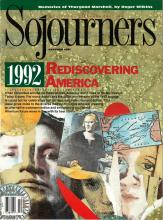Each of us is a secret that God makes public: "My frame was not hidden from thee, when I was being made in secret, intricately wrought in the depths of the earth" (Psalm 139:15). But not all secrets are as joyfully unambiguous as the birth of a new life. There are many matters we prefer to hide and so we speak of "skeletons in the closet" and not "airing dirty laundry in public."
Secrets often bring dysfunction and unease. "Don't trust, don't talk, don't feel is supposed to be the unwritten law of families that ... have gone out of whack, and certainly it was our law," Buechner admits about his own family.
In some respects, Buechner's life is an open book. An ordained Presbyterian minister, he has authored more than 20 books of fiction and non-fiction. Several of his autobiographical books recount his public life, the headlines of his accomplishments and achievements.
But now Buechner explores his family secrets, reflections that resemble "the back pages of the paper where I have always thought the real news is anyway -- the reviews, an obituary or two, a couple of in-depth reports, the editorial and op-ed sections ... I have found more and more that, like the back pages, it is in the interior where the real news is."
WE ALL HAVE basically the same secrets. In sharing we can find healing. Buechner wrestles with the paradoxical fact "that what we hunger for perhaps more than anything else is to be known in our full humanness, and yet that is often just what we also fear more than anything else."
Read the Full Article
